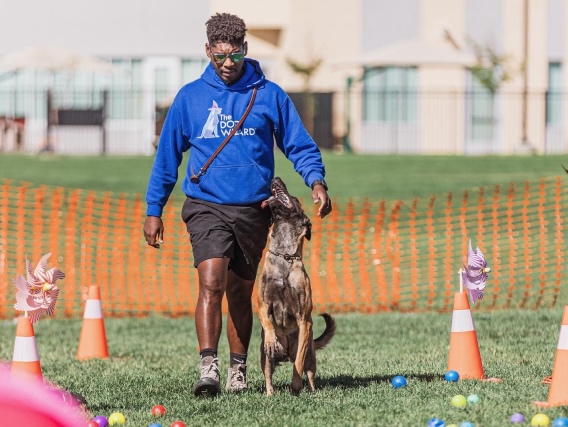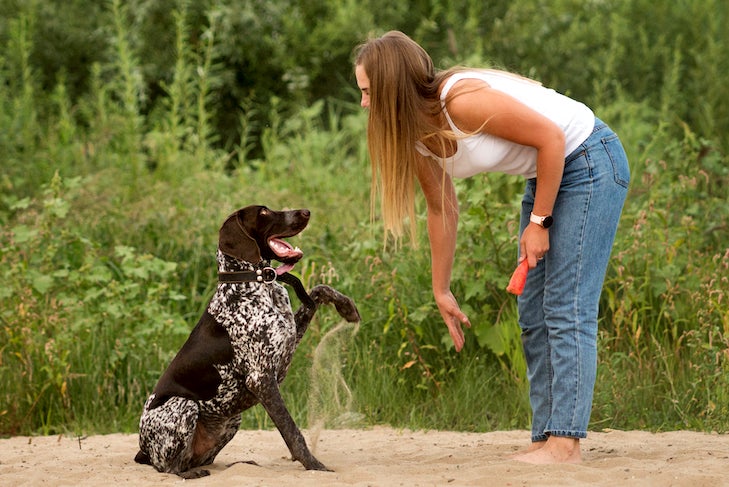Unlock Your Pet's Possible: Proven Pet Training Approaches for Success
Reliable dog training is a nuanced procedure that pivots on recognizing canine actions and using clinically backed strategies. Dog training. By including positive support, developing clear commands, and focusing on socializing, pet proprietors can cultivate an efficient connection with their animals. However, challenges frequently arise that require customized options and an individual method. Exploring these confirmed techniques exposes not only the possibility for behavioral improvement yet likewise the deeper bond that can be created between owner and pet dog. What vital techniques must be taken into consideration to genuinely unlock your pet's capacity?
Comprehending Pet Behavior
Recognizing canine actions is important for reliable training and fostering a favorable partnership between pets and their owners. A detailed understanding of canine body language, articulations, and social communications is important for identifying their needs and feelings. Canines connect primarily with non-verbal signs; for example, a wagging tail may suggest exhilaration, while pinned ears can signal worry or entry.

Additionally, environmental elements play a significant duty in forming a pet's habits. Modifications in routine, brand-new environments, or the existence of unfamiliar individuals can lead to tension or anxiousness in pets. Identifying these triggers allows owners to mitigate damaging responses and develop appropriate training approaches.
Eventually, a deep understanding of dog actions lays the structure for successful training approaches, enhancing both behavior and the total bond between the dog and its proprietor. dog training near me. This knowledge is crucial for promoting a well-adjusted, happy canine friend
Positive Support Techniques
Reliable training depends greatly on positive support methods, which have actually been shown to generate significant cause shaping wanted behaviors in pet dogs. This approach entails rewarding a pet dog for exhibiting certain behaviors, consequently increasing the possibility that these actions will be duplicated. Incentives can take different kinds, including treats, appreciation, playthings, or playtime, depending upon what encourages the individual pet dog.

It is necessary to progressively eliminate rewards as the pet discovers the behavior, transitioning to recurring reinforcement. This strategy keeps the behavior with time while stopping dependency on consistent benefits. By concentrating on favorable reinforcement, fitness instructors can cultivate a relying on relationship with their pets, promoting a participating and healthy training setting that improves total obedience and performance.
Developing Consistent Commands
A basic aspect of effective dog training is the facility of regular commands. Consistency in commands is essential for effective communication in between the trainer and the canine. When commands are consistent, canines learn to connect certain words with wanted behaviors, which speeds up the training process and improves understanding.
To develop regular commands, it is essential that all member of the family utilize the same terminology and gestures. If one person makes use of "sit" while an additional claims "rest down," it can develop complication for the pet. Select clear, unique words here are the findings for commands and make sure everybody associated with the dog's training abides by these options.
In addition, repeating is vital. Strengthen commands via frequent practice, making certain that the pet gets enough possibilities to react properly. When a canine efficiently adheres to a command, immediate positive reinforcement needs to adhere to. This could be in the type of deals with, appreciation, or playtime, solidifying the connection between the activity and the command.
Lastly, be person. Establishing constant commands requires time and effort. With commitment and clearness, you will help your canine create a solid understanding of expectations, eventually resulting in a well-behaved friend.
Socializing and Exposure
Interacting socially a canine is necessary for promoting a positive and well-adjusted buddy. This process includes subjecting your go to these guys pet dog to a variety of settings, people, and various other animals to establish their social abilities and flexibility. Early socialization, preferably in between the ages of three to fourteen weeks, is vital, as it lays the foundation for a pet dog's future actions.
During socialization, purpose to offer favorable experiences in different settings, such as parks, hectic streets, and homes with other pets. Introduce your pet to various stimuli, consisting of audios, sights, and smells, making sure that each encounter is satisfying. This exposure helps reduce concern and anxiousness, paving the way for an extra durable canine.
Taking part in regulated group play sessions with other canines can also boost social abilities, instructing your pet suitable communications and borders. Always check your pet dog's comfort degree throughout these experiences, progressively enhancing direct exposure as their self-confidence grows. Keep in mind, the objective is to develop a well-rounded family pet that grows in diverse situations, promoting a harmonious partnership with both human beings and various other animals. Prioritizing socialization will substantially add to your pet's overall happiness and behavior throughout their life.
Conquering Common Training Difficulties

One more frequent problem is distraction. Pet dogs might have a hard time to concentrate in strange or hectic setups. Gradually desensitize your pet dog to distractions by starting training in a silent environment and slowly presenting even more stimuli as they end up being proficient (dog training charlotte nc). Favorable reinforcement methods, such as deals with and praise, can maintain motivation and emphasis.
Additionally, behavioral problems like leaping or too much barking can come to be frustrating. Address these by instructing alternate habits, such as resting comfortably when welcoming visitors. Uniformity and perseverance are critical; reinforce desired behaviors consistently and avoid scolding, which can lead to confusion.
Lastly, recognize that each dog is unique, and training timelines may differ. Dressmaker your strategy to your pet's specific demands, and look for expert assistance if required. With perseverance and the best strategies, overcoming these challenges can bring about a trained, delighted canine friend.
Final Thought
In final thought, unlocking a dog's possible demands a detailed method that incorporates an understanding of canine behavior, the application of favorable reinforcement techniques, and the facility of constant commands. Early socialization and direct exposure to varied environments further boost a pet dog's adaptability and self-confidence. By attending to common training obstacles with customized strategies and perseverance, a harmonious and cooperative partnership between pet and handler can be fostered, eventually resulting in a mannerly companion efficient in flourishing in numerous circumstances.
Effective pet dog training is a nuanced process that pivots on understanding canine habits and employing clinically backed strategies.Comprehending dog habits is essential for efficient company website training and fostering a positive partnership between pet dogs and their owners.Efficient training counts heavily on positive support techniques, which have been revealed to yield considerable outcomes in shaping preferred actions in dogs. When commands are consistent, pet dogs learn to connect particular words with wanted behaviors, which speeds up the training procedure and enhances understanding.
In final thought, opening a pet's potential requires a thorough approach that incorporates an understanding of canine habits, the application of favorable support techniques, and the establishment of consistent commands.